Search engine results page (SERP) volatility occurs when there are some major fluctuations in the search engine rankings over a period of time.
When there is an elevated level of volatility, the search engine rankings are in disarray and constantly changing.
A low level of volatility means that the rankings are stable.
Think of it like the weather.
When it’s going to rain and thunderstorm, you might encounter issues if you want to fly or go on a road trip. When the weather is nice, clear, and sunny, it’s a wonderful day to fly or go for a ride and enjoy the scenery.
Why Is SERP Volatility Important?
As SEO pros, we spend a lot of time making sure our clients increase visibility, revenue, traffic, and sales year over year, quarter over quarter, and month over month.
We must pay attention to the SERP volatility because it can impact our client’s visibility and performance.
All brands depend on non-branded and branded keywords to drive traffic, conversions, and business value – and if your site experiences a steep decline in visibility because the SERPs are volatile, guess what? You’re going to have a bad day or week, depending on how long it lasts, and likely a big loss in revenue, conversions, and traffic.
One common reason why the SERPs can be volatile is when there’s a new update release from Google, like the core updates in March or the most recent core update in August.
These can lead to high volatility and cause websites to experience a drop in visibility and organic key performance indicators.
With the August core update, Google placed more emphasis on ranking quality content, which had a significant effect on rankings in SERPs.
Google tends to release core updates to help end users get the most helpful and reliable search results.
All SEO pros must continue to focus on quality, providing a great user and content experience, etc., and we should be able to weather the storm.
Other possible reasons that the SERP volatility can impact your site could be because you made recent updates to your site, search intent changes, etc.
To explore these, you would have to conduct a robust audit of your site.
How Can I Measure SERP Volatility?
There are a bunch of different tools to measure SERP volatility, which are listed below.
Mozcast is one of my favorite tools to look for SERP volatility.
It has a weather report showing how turbulent the Google algorithm has been over the last 90 days. The hotter and stormier the weather is, the more unpredictable the SERPs have been.
One of the things I admire about this tool is that it is free and has been for a very long time.
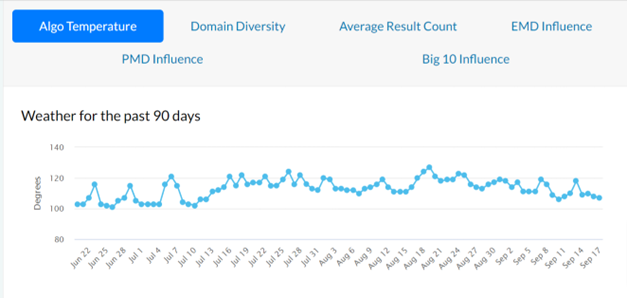 Screenshot from Mozcast, September 2023
Screenshot from Mozcast, September 2023Semrush Sensor is also one of my favorite SERP volatility tools. I love the visualization and how you can switch between mobile and desktop, countries, and categories, and compare different SERP features like Featured Snippets, instant ads, etc.
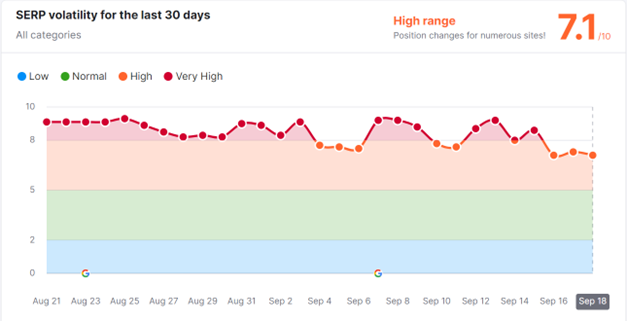 Screenshot from author, September 2023
Screenshot from author, September 2023I think Semrush does the best job because it lists when Google updates occurred and has a list of FAQs to show how the score is calculated, etc.
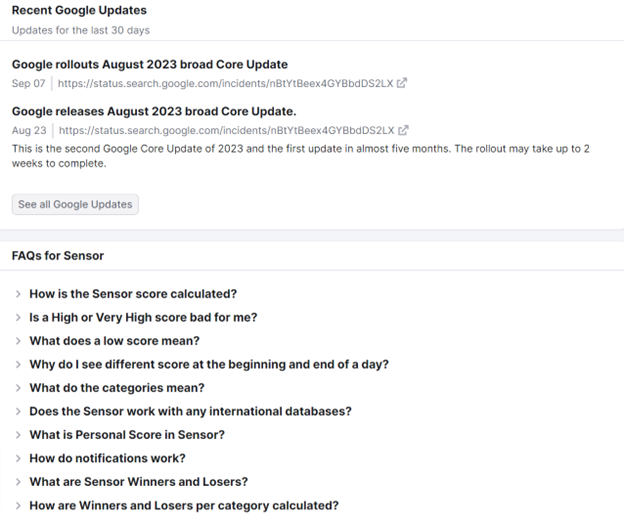 Screenshot from Semrush, September 2023
Screenshot from Semrush, September 2023Mangools is another great SERP volatility tool that is also very visual and allows you to switch between desktop and mobile – but it just does not have all the features of Semrush.
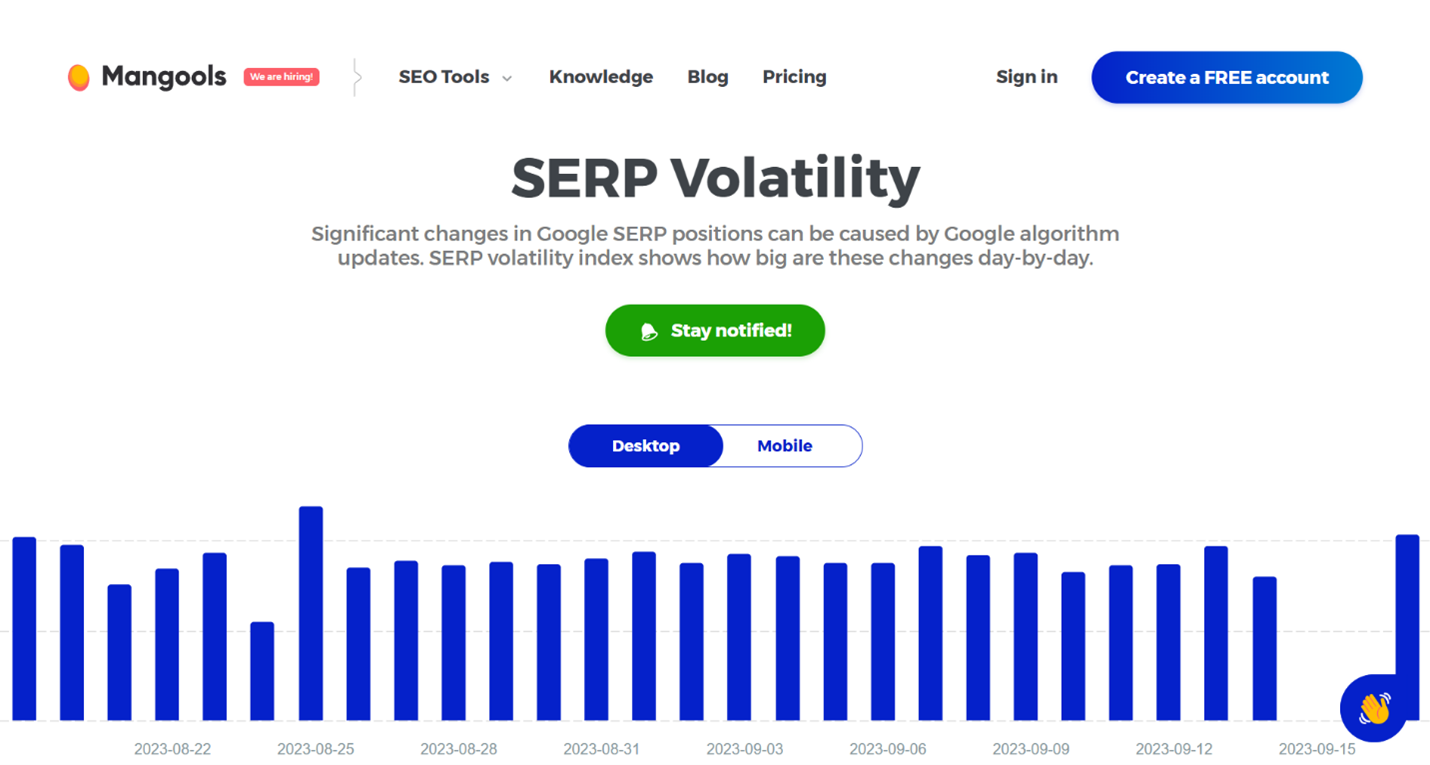 Screenshot from Mangools, September 2023
Screenshot from Mangools, September 2023Algoroo is another SERP visibility tool that displays weekly winners and losers. It has the corresponding date of when a Google update came out, making it easy to pinpoint which update could have had a potential impact on your site.
It’s not nearly as sophisticated as other tools, and the winners and losers are not meaningful unless you can add in sites that you care about – which you can’t.
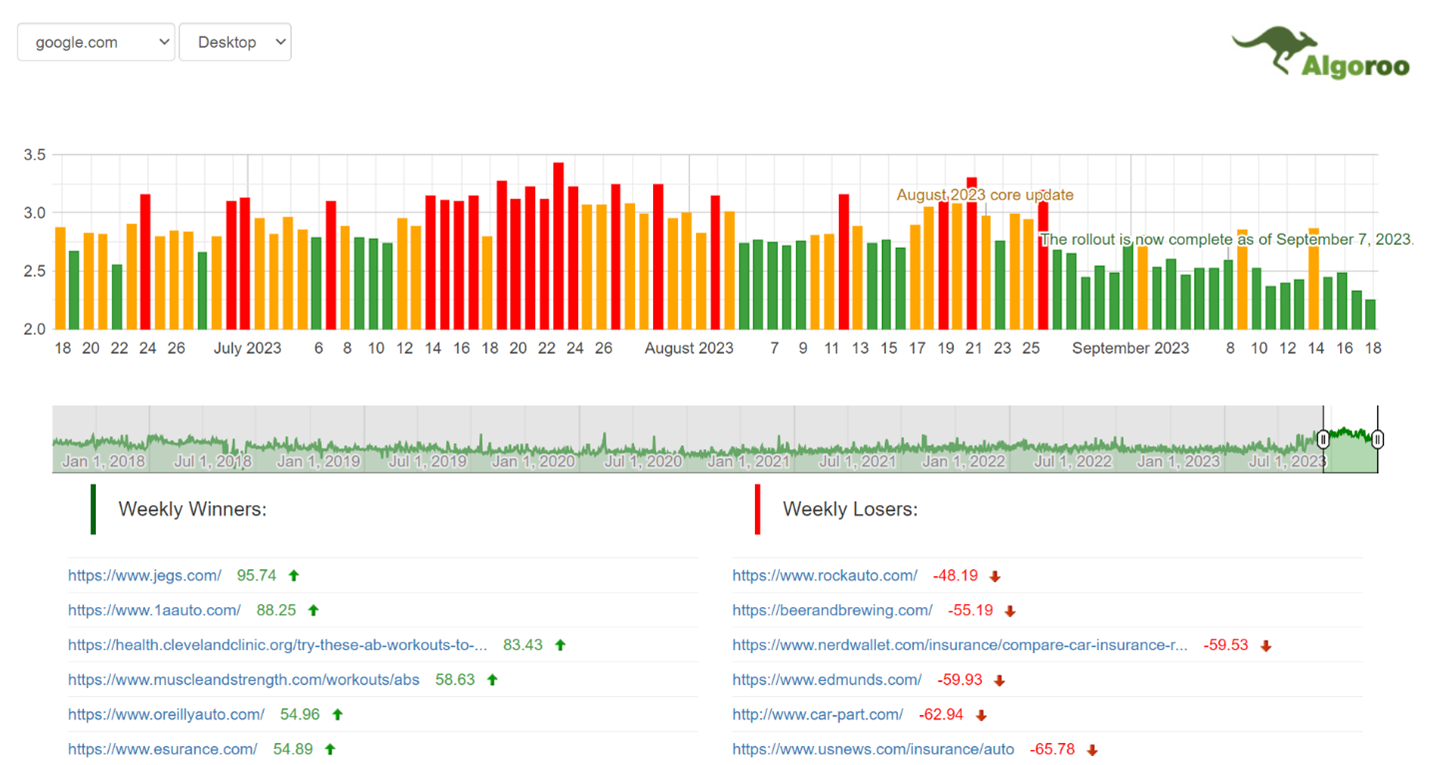 Screenshot from Algoroo, September 2023
Screenshot from Algoroo, September 2023cognitiveSEO has a useful tool called Signals and is also a great SERP monitoring tool.
Signals allow SEO experts to monitor SERP volatility across global and local, and switch between rankings that have changed 3, 5, or 10 positions over time, which drive the most traffic.
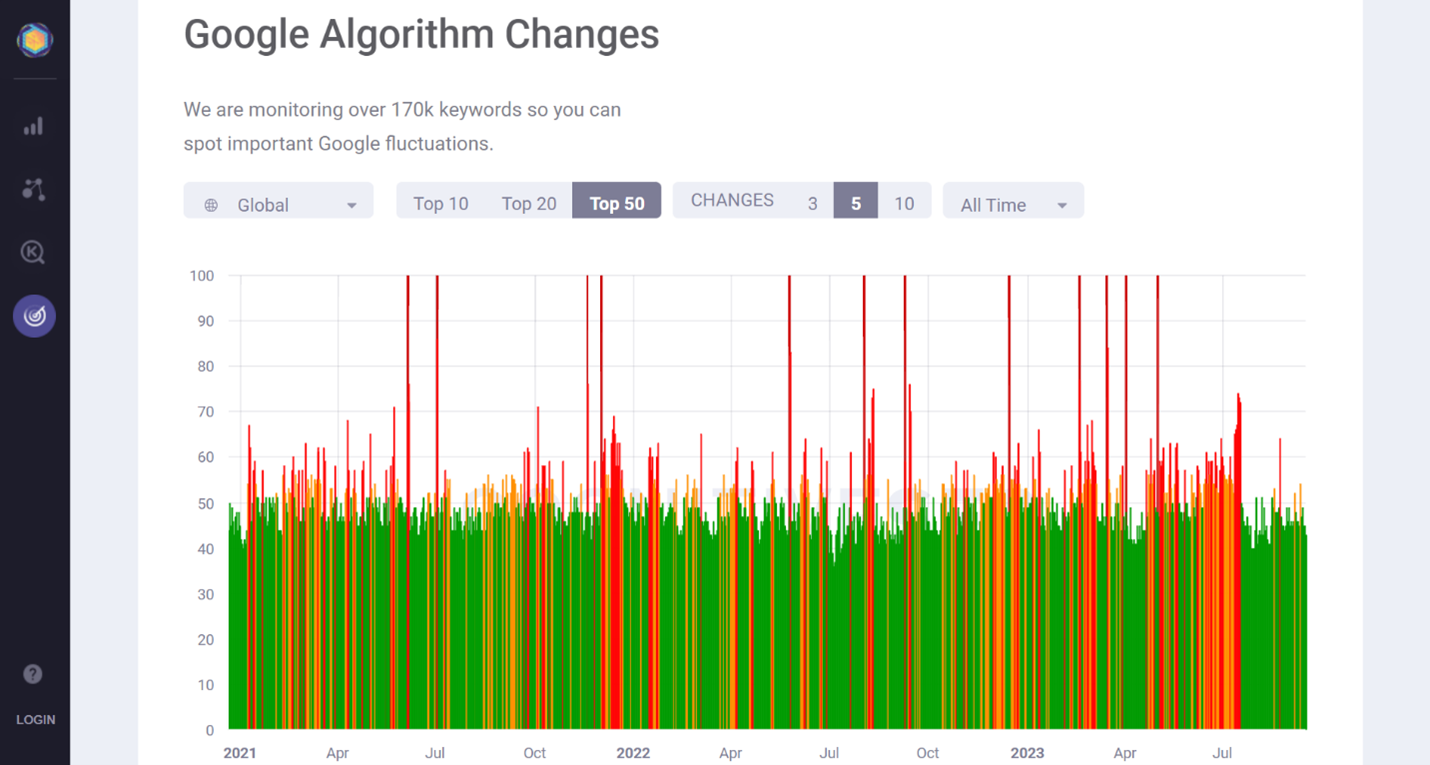 Screenshot from cognitiveSEO, September 2023
Screenshot from cognitiveSEO, September 2023What Should I Do When There Is SERP Volatility?
The number one golden rule is not to panic or be reactive right away until you know what exactly is going on. Start looking into what and where the changes occurred.
In addition, follow these guidelines:
Always Monitor Your Visibility
Consistently monitor your keywords to see any changes in the SERPs. Review your landing pages to see what keywords and pages were impacted and if your page satisfies the end users’ information needs.
Also, review lost backlinks, loading time, etc.
Just because you see a decrease in traffic does not mean your site was hit by a core algorithm update because Google is constantly adjusting the core update, and there may not be anything wrong with your content or site structure.
Always On Monitoring
Conducting site audits is a fantastic way to keep track of the performance of your site. You can also take other steps to stay proactive and adapt to changes in rankings.
These precautions could include regular SEO audits, a solid backlinking strategy, and frequent optimizations that keep you competitive.
Set up keyword alerts if your SEO platform has them, so you know right away if something has changed (i.e., rankings drop, title tag changes, etc.)
Optimize For Mobile
The landscape of online search is predominantly mobile, with desktop searches lagging behind mobile searches.
Unbelievably, some sites are still not optimized for mobile and still are not passing Core Web Vitals (CWV).
Failing to optimize your website for mobile can result in a drop in traffic as users seek better mobile experiences elsewhere.
Analyze Historical Data
One critical aspect that some brands and SEO pros tend to overlook is historical data.
Reviewing historical data can expedite your analysis and unveil keywords and pages that were once high performers but may have slipped from the first page due to numerous factors.
These factors could include technical issues, outdated content, or competition outperforming with a robust content strategy, to name a few.
It’s also essential to examine historical link activity to identify any losses of high-quality and relevant backlinks. Losing even a few premium backlinks can sometimes lead to a drop in website visibility, particularly during site restructuring or migrations.
Verify Analytics Configuration
Common errors are misconfigured analytics, the absence of tracking code on new page templates, or tracking code completing being removed from page templates.
Given SEO’s emphasis on producing high-quality content aligned with user intent, it’s crucial to ensure that tracking code is present on all web pages and accessible to search engines.
This enables proper attribution of traffic to organic search.
Adapt To Search Landscape Changes
The search landscape has undergone substantial transformations in recent years, particularly in Google’s SERPs, impacting visibility and traffic.
For instance, some of the biggest changes include the paid search ads above the fold, Search Generative Experience (SGE) – which is an early step in transforming the Search experience with generative AI – and the removal of FAQs, which will continue to alter the SERPs and impact organic search.
Evaluate The Impact Of Other Marketing Campaigns
Marketers often overlook how other marketing campaigns being conducted can significantly affect SEO.
Pay attention to other marketing campaigns like paid, display, etc., because they can impact each other, especially from a branded perspective.
If, for example, paid search or TV advertising was not executed in a particular year, it may lead to a decline in branded query volume, impacting branded traffic compared to the previous year.
The absence of display advertising could limit impressions from branded keywords, further affecting organic search traffic.
Anything that enhances brand awareness can have a positive impact on SEO.
Monitor Website Changes And Technical Issues
Developers often make site updates without informing the SEO team.
Changes to title tags, page headers, or URL structures can lead to drops in rankings and traffic.
Always make sure that you’re communicating, being kept in the loop on all site changes, and have SEO monitoring set up to avoid any issues.
Conduct A Comprehensive Site Content Audit And Create Helpful And Useful Content
Frequently, the primary reason for declining search visibility is a lack of user engagement with your website content.
Examine your site’s content critically. Is it of high quality? Does it provide value, transparency, and information? Is it satisfying the search information need?
Compare your content honestly with that of your competitors that outrank you and seek ways to improve.
Remember that if users are not sufficiently engaged with your content, Google is unlikely to prioritize it in search results. Always remember to focus on creating high-quality and helpful content using the E.E.A.T. guidelines.
Wrapping Up
It’s imperative that brands, site owners, and marketers always monitor the SERPs and keep up to date with Google updates to see why there have been fluctuations in visibility, which can impact organic key performance indicators.
SERP volatility tools provide value to help you point out when changes are going on and what updates they could be related to.
If you’re hit by a core update, don’t panic.
It’s important to review your site for SEO best practices, including useful and helpful content, great information, and providing users with the best content and user experience across all stages of the user journey to make sure you drive incremental traffic, revenue, and conversions for your clients.
More resources:
- 22 Possible Reasons Why Your Site Traffic Dropped
- Why & How to Track Google Algorithm Updates
- Tracking Google Knowledge Graph Algorithm Updates & Volatility
Featured Image: eamesBot/Shutterstock





